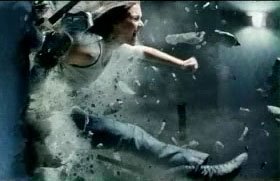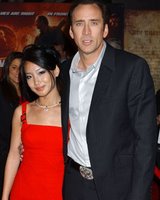'Getting top performance from an Inuit cast and crew required creating an Inuit 'culture of production' -- with good humour, no fear, a lot of patience and a spirit of flexible cooperation and teamwork rather than military-style control. Inuit have learned through the millennia that people cannot overpower reality. Our objective was not to impose southern filmmaking conventions on our unique story, but to let the story shape the filmmaking process in an Inuit way.'
(Zac Kunuk - Director)
we seem to be living in the midst of a global plague of lists. top ten tips infest the silly pages and the daytime schedules - kissing, teeth-whitening, getting seat upgrades on planes - wherever you look, whatever you're doing, there's someone bursting to advise you on how to do it better, faster, cheaper. by far the most irksome, though, are these top 100 lists. whenever I pay attention (increasingly rarely - apart from Neighbours, of course) to the box in the corner, there seems to be yet another meejah proto-sleb slithering onto the bottom rung of the sleb ladder by hosting yet another cheapskate piece of programming called the one hundred best .... songs, cereals, serial killers, septicemia victims, sump-oil addicts, cervixes .... it just seems to go on and on, hyperbole humping hyperbole until finally - desperate drum-roll - they come to the final superlative - the best!!!! voted by you!!!!! the public!!!!! which is always something by the beatles.
even if it's cereals.
which makes it just a teeny bit embarassing to have to announce that, actually ( meekly raises own stumpy little hoof), I've just watched the finest movie I've ever seen in my entire life.
whenever I've been asked in the past, my stock response, for want of having to go yet again through all that tedious conditional stuff about genres and defining classics and developing tastes and depending on this that or the other, has been to say Tarkovsky's 'Mirror', and leave it at that. but, from today onwards - move over Anzdrey - I have to practice yet another difficult name and title - Zac Kunuk's Atanarjuat - The Fast Runner.
I was little prepared for what this turned out to be, apart from having glanced at a review which had made it sound sufficiently interesting to bother adding to the ScreenSelect list. the fact of its having been released all of four years ago and won a clutch of prestigious international prizes had passed me by completely. these things happen when you take your eye off the ball. I knew it was going to be beautifully crafted and interesting, but I was totally unprepared for an experience which, if you'd told me a day earlier, I'd have said was impossible: the being flung back, as a spectator in the comfort of my own living room, into something very closely resembling that intensely visceral, pre-literate experience of what dear old Aristotle called catharsis.
in the Hellenic dramas, catharsis meant an audience at a tragedy becoming so closely involved in the acted-out experiences of people whose lives are transformed by forces of destiny directly attributable to divine interference that a form of spiritual cleansing and recharging takes place - a rehab for the soul involving purging and renewal through identification. the ancient Greek katharsis has the same root as the word for menstruation. when Aristotle used it to describe the proper objective of the dramatic tragedy he was employing the word in a uniquely affirmative sense that might, incidentally, give pause to those whose view of older civilisations sees patriarchy only as a form of oppression, but that's by the by.
the need for the dramatic experience per se hasn't changed much with time, although the theatre has, and it's been a very long time indeed since I felt anything like what I'm talking about here in the arena of the modern theatre. which just makes it all the more remarkable that this movie should ring that bell so resoundingly, being, as it is, a first major outing for the tiny independent Inuit production company (actually the only Inuit production company), Isuma, filmed entirely on location in the Canadian Arctic using a cast of mostly amateurs, with the dialogue exclusively in Inuktitut. thank heavens for subtitles, although I suspect that the sound of this language alone, one of the strangest I've ever heard, is a significant contributor to the overall effect.
the film is based on an ancient Inuit legend - a simple story about love and jealousy, murder and revenge, atonement and forgiveness, that might have been lifted from the epic canon of any culture at any time. without revealing too much - the less you know about what happens the better - it's safe to say that it contains one of the most astonishing screen chases ever - the protagonist naked and barefoot, running across the melting sea-ice, where the coldest of deaths is one mistake away. it makes the car chase in Bullitt seem like a stately procession in a padded bumper-car.
but that accounts for only five minutes of a three-hour movie which passes by unbelievably fast - astounding that three hours can fly by like that - as if Kunuk himself had temporarily assumed the time-bending mantle of one of the disturbing shamans who play a small but inordinately significant part, negotiating the uneasy relationship between the living and the spirits in this icy world where starvation is an invisible but omnipresent family member, always imminent, and kept at bay only by sets of survival skills that truly beggar belief.
if this were just a docudrama - a kind of latter-day Nanook of the North - it would probably have won anthropological and ethnological prizes for its realism alone: a hundred-times better funded wardrobe and properties department would have been pushed to achieve these sorts of levels of authenticity: from the sinew-belted sealskin longjohns to the polished-bone sunglasses, it all rings resoundingly true, and lacks only the smells (which, clearly, in a sweaty igloo stuffed with the farting and belching bodies of too many randy young men, are mind-bogglingly awful) to complete the picture of life lived as if on another planet entirely.
and the sounds! the crunch of mukluks (or are they kamiks?) in snow, the wind on the tundra, the swish of spit-polished caribou bone sledge-runners on ice, the crunch of fist on cheekbone, the howling of the dogs, the crunch of ice-block laid on ice-block to construct those extraordinary domed homes.
but this isn't an anthropological exercise; however lovely the people (who smile like angels) and however beautiful the landscape, this movie is not about - or only tangentially about - their different kinds of beauty. Kunuk's movie is a hair-raising accomplishment - the enactment of a legendary tale that is so immediate and compelling that, until you stop to think about it (later, when the movie's done what it has to do) you really have no clear idea when it is supposed to have taken place - not now, obviously, because there's no snowmobiles or satellite dishes, but, until you realise that there's no use of metals at all - something that was unavailable to the Inuit until the Europeans arrived in the seventeenth century - it might as well be happening anytime in the last thousand years, up to and including yesterday. the point being that, unlike countless movies that have authentically recreated the appearance of a particular time in order to tell a story, or countless theatre productions which have translated the classics into a different time in order, supposedly, to refresh their impact, Atanarjuat succeeds somehow in melding the timely with the timeless in a totally artful, but seemingly artless way, telling the story exactly as it comes - true to fifty generations of oral tellings-on, whilst simultaneously making it seem as though it is happening right here, right now, and succeeds, what's more, in fusing the epic concerns - of morality, of justice, of the proper application of power and responsibility - and the human concerns - of love, friendship, family duties, work and pleasure - into one seamless, magical garment that favours neither but exalts both.
Atanarjuat is a great artwork in that it totally transcends its immediate concerns, illuminating areas of understanding and empathy that can only be illuminated by great works of art, and which are as needful of illumination now - probably more so now - as when the first artists struck the first flints of artistic illumination. it is our experiences of such artworks that provide, aside from those self-constructed time-markers composed of our own memories and experiences, the most important milestones: markers in the timeline of the experience of mankind that synchronise, momentarily, with our own, and confirm our sense of belonging, of being on the right path, of being, actually, in the right time.



